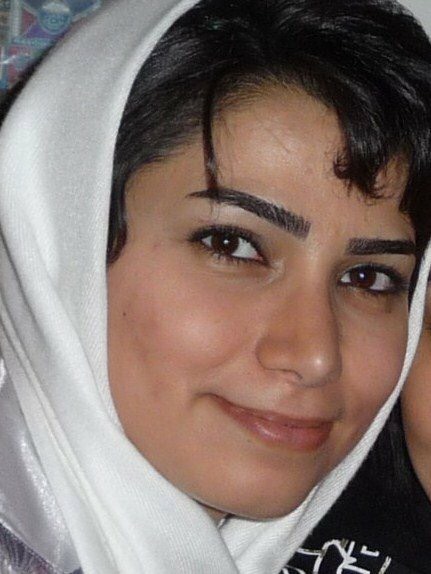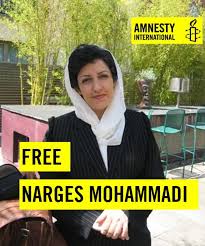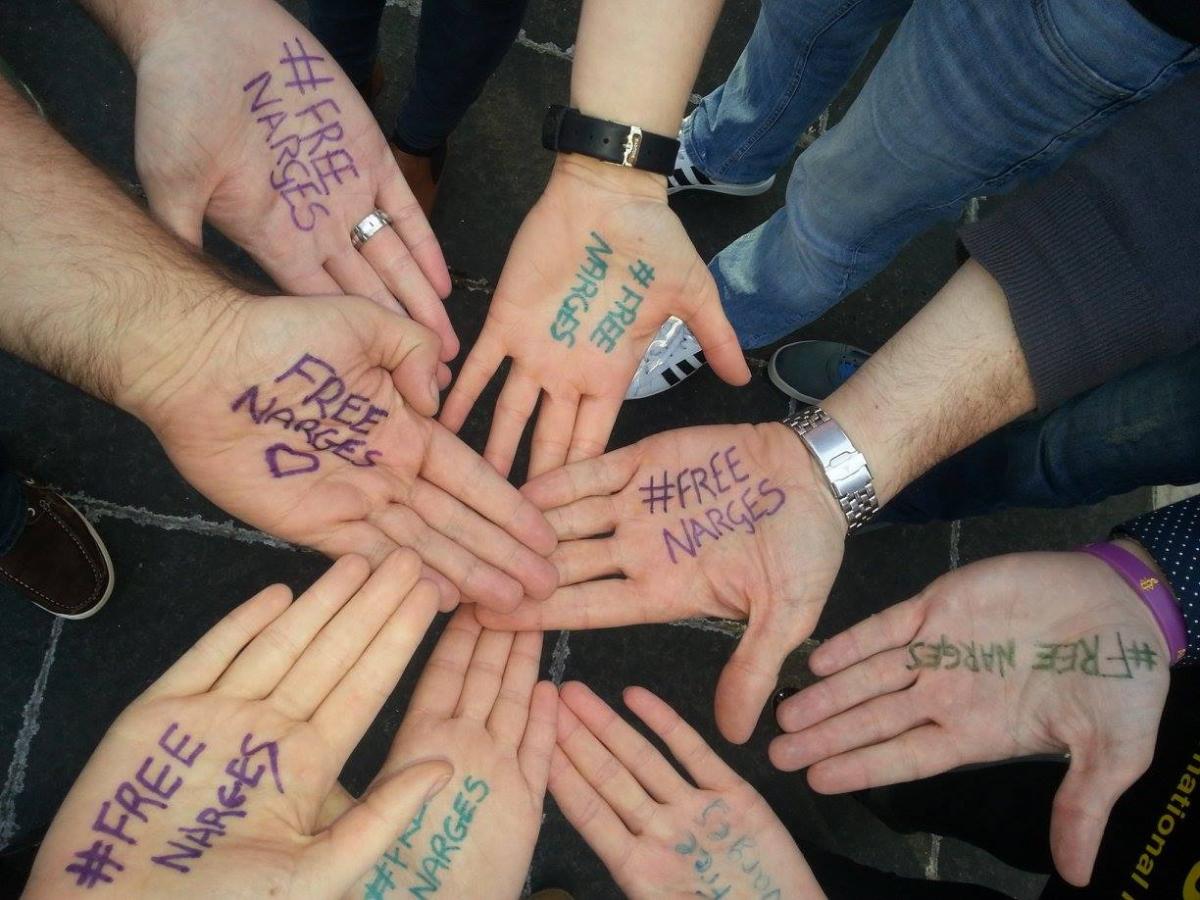In 2013 and 2014, Amnesty International advocated for prisoner of conscience Maryam Shafipour to be released from Iran’s notorious Evin Prison. In March 2017, Maryam spoke with Amnesty International in Canada about her activism, about the pressing need for continued action to end human rights abuses in Iran, and about how we can urgently take action to release her friend, fellow activist, and former prison-mate Narges Mohammadi
>>TAKE ACTION NOW TO FREE NARGES MOHAMMADI
Maryam, you’re a long-time activist. What can you tell us about your activism in Iran?
 I started my peaceful activities when I entered university. It was not possible under Iran’s repressive regime to establish an organization. Students like me worked by trial and error, alone or in small groups, without any instruction or guidance, which can lead to being suspended from school, expulsion from college, or even going to prison. Everything is controlled by the government, from cultural to human rights activities. If you do not follow the government’s policy, you are recognized as a political activist and accused of charges against national security.
I started my peaceful activities when I entered university. It was not possible under Iran’s repressive regime to establish an organization. Students like me worked by trial and error, alone or in small groups, without any instruction or guidance, which can lead to being suspended from school, expulsion from college, or even going to prison. Everything is controlled by the government, from cultural to human rights activities. If you do not follow the government’s policy, you are recognized as a political activist and accused of charges against national security.
In the last 37 years, after Islamic revolution in Iran, the suppression of protesters has become more systematic. Artists, musicians, or even social media users are repressed by the government. But Iranian activists have not quit demanding their rights, and after each repression they have found a new way to continue their activism again.
How did this activism lead to Amnesty campaigning on your behalf in 2013-2014?
I was called to court in 2013 for the second time. A Revolutionary Court in Tehran sentenced me to seven years imprisonment due to my peaceful activities. I got sick there because of the stressful situation and contaminated environment, and the government cruelly prevented me from having access to medical facilities for 11 months. Meanwhile, Amnesty International, like other human rights organizations, became my voice, supported me, and forced the government to stop my gradual murdering. Finally, the government was forced to release me after two years because of these external pressures.
Amnesty International, like other human rights organizations, became my voice, supported me, and forced the government to stop my gradual murdering.
Why is Iran increasingly cracking down on women’s rights and women human rights defenders?
Putting pressures on women in a variety of ways is a strong means of suppression. These actions can include forcing women to wear the hijab with the purpose of debilitating them, legislating discriminatory laws against women which deprive them of their human rights, and gender discrimination laws which are authorized by either parliament or direct orders of Iran’s super leader or religious authorities. Women have always been in the first line of movements for making changes in Iran. Maybe, it can be said that Iran’s government looks at women as its strongest enemy since it knows that devoting little space to women will create an evolution which cannot be retrofitted.
The pressure is even more on women activists. Not only do they receive repression from government. They are required to fight the traditional belief that a good mother never endangers herself and her children.
Now that you’re living outside Iran, how has your activism changed?
Working on Iran’s human rights issues is very difficult both inside and outside Iran. Inside Iran, you are required to be very cautious as you are under strict security control, and you should constantly expect an arrest and long imprisonment. Your activities are very limited, but at the same time very efficient and inspiring. It is considered a miracle if these limited activities are matched with activism from outside Iran. The Iranian government is responsive to international pressure. But what l have earned in my short period of living outside Iran is that human rights violations in Iran are not met with strong action from western governments.
Women have always been in the first line of movements for making changes in Iran.
What can you tell us about your relationship with prisoner of conscience Narges Mohammadi?
 I’ve known Narges since I was a university student. She is a popular and well-known feminist and human rights activist. When I was a student, she helped us to find a lawyer so that if we were arrested and called to court, we would be able to defend ourselves. At the end of my imprisonment period, she was arrested and we were in the same place. Being together in one prison was a source of encouragement for me but at the same time made me sad. She was sick and had two small children, and before being jailed, she single parented her children because her husband lived far away.
I’ve known Narges since I was a university student. She is a popular and well-known feminist and human rights activist. When I was a student, she helped us to find a lawyer so that if we were arrested and called to court, we would be able to defend ourselves. At the end of my imprisonment period, she was arrested and we were in the same place. Being together in one prison was a source of encouragement for me but at the same time made me sad. She was sick and had two small children, and before being jailed, she single parented her children because her husband lived far away.
In Iran, we have a lot of discriminatory laws against women, and everything gets worse if you are a prisoner of conscience and a mother at the same time. The government uses your children to torture you. When Narges and I were in the same prison, prisoner mothers could visit their children and hug them every two weeks for 20 minutes. There was no access to phone calls. As a prisoner of conscience, if you continue to insist on your beliefs, your first punishment is being banned from visiting your children.
In other prisons where women with other charges are kept, the children live with their mothers inside prison, even with people who are criminals. Their nutrition, access to education, and physical health are a catastrophe.
The idea of the prison mothers campaign first came to Narges’ mind in prison. We talked about it and expanded the idea. As soon as I was released from prison, I called Shirin Ebadi (the Nobel peace prize winner) and took preliminary steps to launch the campaign. The campaign started its activities in a gathering in front of the International Court of Justice in The Hague in support of prisoner mothers.
Now, I’m advocating for Narges. In 2016, I launched the #FreeNarges social media campaign following the unfair verdict of the Iranian judiciary sentencing Narges Mohammadi to 16 years in prison. We, a number of independent civil rights and human rights activists, decided to launch this campaign as part of a concerted effort to support Narges and her goal of eliminating discrimination against Iranian women, and to draw attention to her plight.
Her long imprisonment is the Iranian government’s revenge for her constant and consistent advocacy. One of her charges is trying to create civil society. Let us, as civil society, stand beside Narges and work to #FreeNarges.
Why is it so important to use social media to show Iranian officials that the world is watching?
Social media networks in Iran and other countries have helped defend human rights and make violations visible. Iran’s government is afraid of publicizing its human rights violations.
Social media, especially Twitter, has become an efficient arena for people to demand their human rights be respected, and to protect prisoners of conscience. An Iranian prisoner of conscience went on a hunger strike and all the media kept quiet about his situation, but a Twitter storm was started. Once it became the hottest news in the world he was released. When Narges went on a hunger strike last year to protest being banned from contact with her children, her hunger strike’s publicity on social media led to her finally being granted permission to phone her children.
On March 8, International Women’s Day, what would you like Canadians to do to #FreeNarges?
 Narges was sentenced to 22 years in prison. Despite two decades of advocacy, four arrests, and three prison sentences, still she insists on eliminating discrimination against women. She is the most honest and caring feminist and human rights activist I have had the honor to meet. Her long imprisonment is the Iranian government’s revenge for her constant and consistent advocacy. One of her charges is trying to create civil society. Let us, as civil society, stand beside Narges and work to #FreeNarges.
Narges was sentenced to 22 years in prison. Despite two decades of advocacy, four arrests, and three prison sentences, still she insists on eliminating discrimination against women. She is the most honest and caring feminist and human rights activist I have had the honor to meet. Her long imprisonment is the Iranian government’s revenge for her constant and consistent advocacy. One of her charges is trying to create civil society. Let us, as civil society, stand beside Narges and work to #FreeNarges.






















